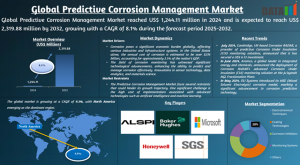Predictive Corrosion Management Market | Growth Trends, Forecast, Opportunities 2025-2032
The Global Predictive Corrosion Management Market is expected to reach at a CAGR of 8.1% during the forecast period 2025-2032.
Market Overview:
Predictive corrosion management leverages data analytics, sensors, artificial intelligence, and IoT technologies to anticipate corrosion risks and prevent damage before it happens. This forward-thinking approach significantly reduces maintenance expenses, minimizes unplanned downtime, and curbs environmental hazards. As organizations increasingly focus on asset integrity and regulatory adherence, the global market is witnessing strong growth.
Download Sample Report Here: https://www.datamintelligence.com/download-sample/predictive-corrosion-management-market
Market Drivers & Opportunities:
Rising Industrial Automation: The integration of AI, machine learning, and digital twin technology is enabling smarter corrosion diagnostics and prediction.
Aging Infrastructure: Aging pipelines, bridges, and industrial facilities, especially in developed nations, necessitate effective corrosion monitoring systems.
Regulatory Push: Stringent environmental and operational safety laws are encouraging enterprises to use predictive technologies.
Sustainability Goals: Reducing material waste and extending asset lifespan align with global sustainability targets.
Market Segmentation:
By Technology:
Electrochemical Techniques
Coating Technologies
Corrosion Inhibitors
Monitoring Systems
Others.
By Deployment Mode:
On-Premises
Cloud-Based
Hybrid.
By Application:
Manufacturers
Service Providers
Government Agencies
Research & Development
Others.
By End-User:
Aerospace
Automotive
Oil and Gas
Marine
Construction
Power Generation
Others.
By Region:
North America
Latin America
Europe
Asia Pacific
Middle East and Africa.
Buy Now & Unlock 360° Market Intelligence: https://www.datamintelligence.com/buy-now-page?report=predictive-corrosion-management-market
Geographical Market Share:
North America dominates the market due to its extensive oil & gas infrastructure and high adoption of digital monitoring technologies.
Asia-Pacific is emerging as a fast-growing region, led by China, India, and Japan, owing to industrial growth and infrastructure modernization efforts.
Europe maintains a constant proportion, focusing on offshore wind energy, pipelines, and water utilities.
Key Market Players:
Leading companies shaping the Predictive Corrosion Management Market include:
Baker Hughes
WebCorr Corrosion Consulting Services
Microsoft
Honeywell International Inc.
SMARTCORR
Cosasco
Alabama Specialty Products
SGS SA
ICORR Technologies
Permasense Emerson.
These companies are making significant investments in AI-enabled monitoring solutions and predictive maintenance platforms.
Recent Developments:
United States
2025: A major U.S.-based oil pipeline operator implemented AI-powered corrosion prediction software, reducing maintenance costs by 30% across its network.
2024: The Department of Energy launched a $50 million initiative to fund predictive corrosion technologies for critical energy infrastructure.
Japan
2025: Japanese manufacturers introduced compact IoT-based corrosion sensors tailored for coastal infrastructure and smart cities.
2024: A collaborative research project between a major Japanese university and an engineering firm led to the development of a predictive analytics platform using quantum sensors to detect early-stage corrosion.
Stay informed with the latest industry insights-start your subscription now: https://www.datamintelligence.com/reports-subscription
Conclusion:
As industries evolve toward smarter asset management and sustainability, the Predictive Corrosion Management Market is poised for long-term growth. Technological innovation, aging infrastructure, and increasing digital transformation initiatives will continue to fuel market demand across regions and sectors.
Related Reports:
Property Management Market
Mobile Identity Management Market
Sai Kiran
DataM Intelligence 4Market Research
+1 877-441-4866
Sai.k@datamintelligence.com
Visit us on social media:
LinkedIn
X
Legal Disclaimer:
EIN Presswire provides this news content "as is" without warranty of any kind. We do not accept any responsibility or liability for the accuracy, content, images, videos, licenses, completeness, legality, or reliability of the information contained in this article. If you have any complaints or copyright issues related to this article, kindly contact the author above.
Historic Monument in Marietta Faces Removal Amid Preservation Concerns
Qatar Integrates Youth into Global Diplomacy Through New Role at United Nations
Maxeemize Offers Complimentary Digital Marketing Audit as Part of Exclusive July Summer Promotion for Small Businesses
Kalendarium
Więcej ważnych informacji
 Jedynka Newserii
Jedynka Newserii

 Jedynka Newserii
Jedynka Newserii

Ochrona środowiska

Polskie przedsiębiorstwa otwarte na transformację w kierunku gospodarki obiegu zamkniętego. Nowa mapa drogowa mogłaby w tym pomóc
Do 2030 roku z gospodarki o obiegu zamkniętym ma pochodzić co czwarty surowiec. Aby przyspieszyć ten proces, w Polsce potrzeba nowej, międzysektorowej Mapy Drogowej dla Gospodarki o Obiegu Zamkniętym – wskazywali eksperci w trakcie Polish Circular Forum. Obecny dokument nie spełnia już swojej roli i wymaga aktualizacji. Na braku jasnych przepisów i systemu wsparcia najbardziej cierpią przede wszystkim małe i średnie przedsiębiorstwa. – Z naszych badań wynika, że tylko 3–3,5 proc. firm z sektora MŚP jest świadomych i przygotowanych do transformacji – ocenia Agnieszka Zdanowicz, wiceprezes Klastra Gospodarki Cyrkularnej i Recyklingu.
Prawo
Wspólna polityka rolna do deregulacji. Trwają prace nad uproszczeniami dla rolników

Prawie 1,6 mld euro – tyle mają wynieść roczne oszczędności dla rolników po uproszczeniu wspólnej polityki rolnej. Zaproponowany w maju przez Komisję Europejską pakiet zmian zakłada redukcję części obowiązków administracyjnych, które dziś spoczywają na rolnikach ubiegających się o unijne wsparcie. Szczególnie dotyczy to płatności dla drobnych rolników. Jak podkreślają eksperci, wszelkie zmiany, które będą działać na rzecz konkurencyjności unijnego rolnictwa, są wskazane, ale przy uwzględnieniu wysokiego poziomu bezpieczeństwa żywności.
Polityka
W rosyjskiej niewoli może przebywać kilkadziesiąt tysięcy Ukraińców. Napięta sytuacja geopolityczna sprzyja Rosji

W rosyjskiej niewoli przebywa około 10 tys. obywateli Ukrainy, z czego ponad 8 tys. to żołnierze. Łącznie jednak może ich być nawet kilkukrotnie więcej. ONZ podaje, że ponad 95 proc. ukraińskich jeńców wojennych jest poddawanych torturom. – Pogarszająca się sytuacja międzynarodowego bezpieczeństwa i wzrost wpływów do budżetu Federacji Rosyjskiej ze względu na wzrost cen ropy mogą się negatywnie odbić na planowanych wymianach jeńców – ocenia Michał Dworczyk, wiceprzewodniczący Komisji Bezpieczeństwa i Obrony w Parlamencie Europejskim.
Partner serwisu
Szkolenia

Akademia Newserii
Akademia Newserii to projekt, w ramach którego najlepsi polscy dziennikarze biznesowi, giełdowi oraz lifestylowi, a także szkoleniowcy z wieloletnim doświadczeniem dzielą się swoją wiedzą nt. pracy z mediami.









.gif)

 |
| |
| |
|